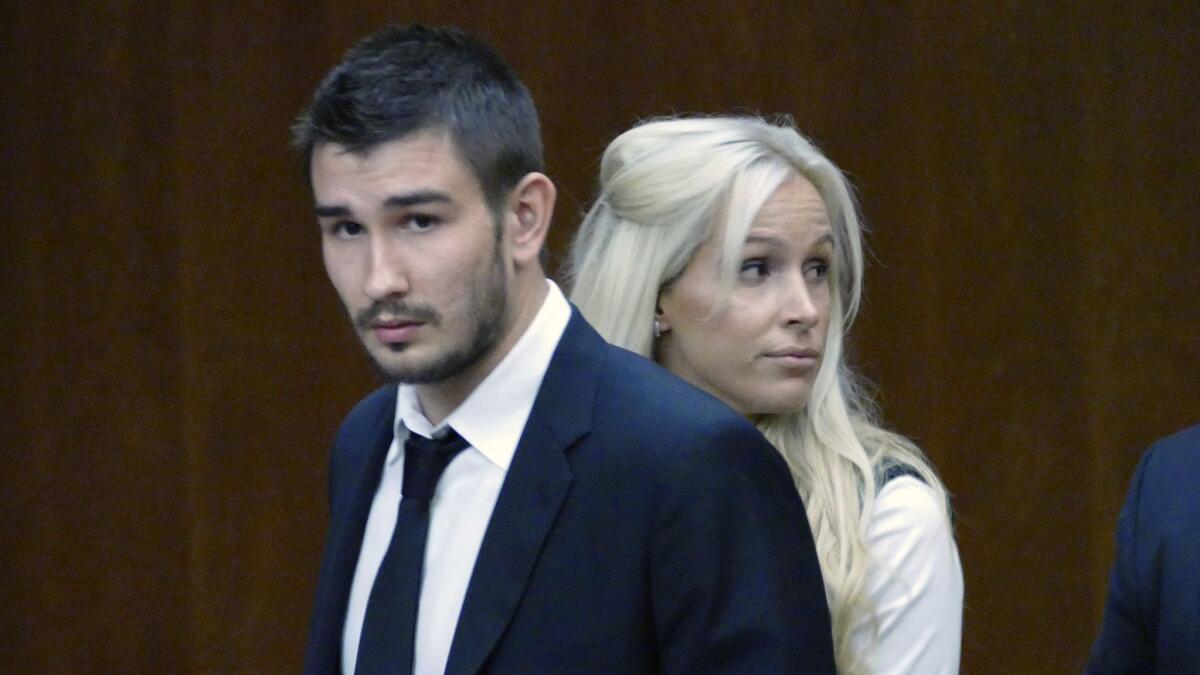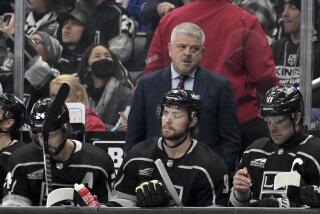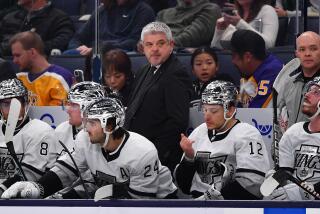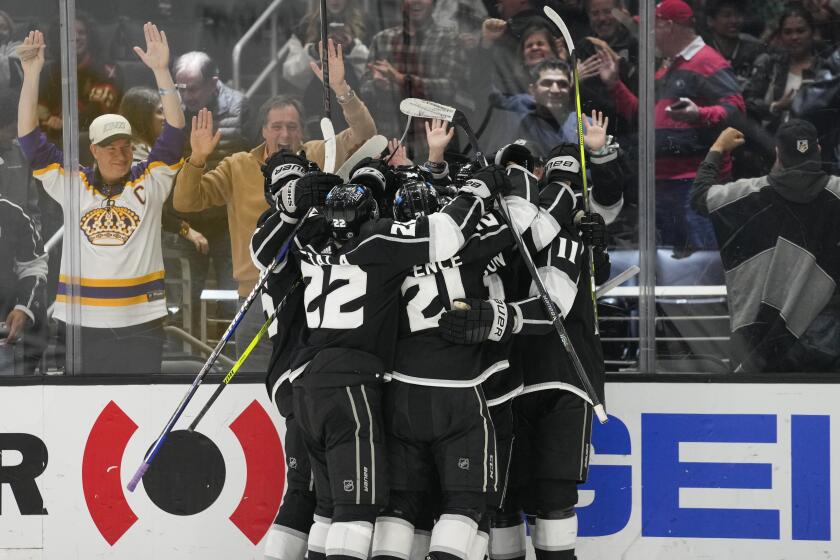Column: Kings make the right decision by cutting ties to Slava Voynov

In three short, definitive sentences the Kings did the right thing and distanced themselves from Slava Voynov by saying the Russian defenseman will not play for them again, even though an arbitrator on Thursday made him eligible to return to the NHL midway through next season.
Reading the team’s statement took only a few seconds, far less time than it took for Voynov to beat his wife bloody in a physical altercation that started at a Halloween party in 2014, an incident that was not a first-time offense, according to an account in the police report given by a nurse who treated Voynov’s wife, Marta Varlamova.
As an organization the Kings haven’t gotten many decisions right lately. With three definitive sentences in a statement that was not attributed to a specific person, the Kings made an important decision and took the correct path.
“Today the NHL arbitrator rendered a final decision on further discipline to Slava Voynov,” the statement said. “From our perspective, the player will not be playing for the Kings. We will now determine the impact of the arbitrator’s decision on our rights to the player and consider our options going forward.”
The Kings terminated Voynov’s contract but are believed to have retained his NHL rights while he was on the voluntary retired list, although it’s unclear what that means and what they can do with those rights.
They could have opted to sign him to a new contract after independent arbitrator Shyam Das on Thursday upheld NHL Commissioner Gary Bettman’s decision to suspend Voynov for the 2019-20 season but amended the terms to credit Voynov with having served 41 games of the 82-game season. Because of that ruling, Voynov is eligible to return at the midpoint of the season, which usually falls in late December or early January. Voynov will be 30 on Jan. 15.
His talent was undeniable: He was a key member of their defense corps, groups that were central to creating the Kings’ identity as a hard-nose, defense-minded team, and he was a key figure in their 2012 and 2014 Stanley Cup championships. At least theoretically he’s still young enough to have an impact in a league that puts a premium on mobile and skillful defensemen.
The length of his absence would mean he’d have to readjust to the physicality, high speed and elevated skill level in the NHL, which could be a long and difficult process with no guarantee of success.
The Kings actually did take him back in a limited sense once before, when they allowed him to participate in a morning skate while he was suspended by the NHL and banned from taking part in team activities but permitted to train at the Kings’ practice facility. Then-general manager Dean Lombardi contended that Voynov had merely gone out to the ice earlier than scheduled, but the league — which had acted swiftly and decisively to suspend Voynov after his arrest — fined the Kings $100,000 for violating the terms of his suspension.
After pleading no contest to one misdemeanor charge of corporal injury to a spouse, Voynov served almost two months in jail and voluntarily returned to Russia in 2015 rather than face deportation proceedings. The NHL wouldn’t allow him to represent his homeland in the World Cup of Hockey, which was played in Toronto in 2016, but he played three seasons in the Kontinental Hockey League and was a member of the gold medal-winning Olympic Athletes from Russia team at the 2018 Pyeongchang Games. He didn’t play anywhere last season.
The idea of redemption becomes fuzzy when you reconsider the offense. Voynov, a well-conditioned and physically strong professional athlete, beat his wife bloody that night and tried to choke her. She had a gash over her eye and “red marks and scratches” around her neck, according to the police report.
That vision should overshadow any notion that it would be OK to bring him back because he could help the Kings — or any other team — by scoring a goal or delivering a body check. He beat her bloody.
Yes, he served his time. Does he deserve a second chance? Or did he already get a second and third chance when he wasn’t caught after he harmed his wife before he was caught and arrested? There’s a bigger issue here, a moral issue, a statement that a hockey player who is guilty of domestic violence forfeits his rights to be trusted and to be looked up to.
The Kings have decided he has also forfeited the privilege of playing for them. Here’s hoping 30 other teams fall in line behind them.
Follow Helene Elliott on Twitter @helenenothelen
More to Read
Go beyond the scoreboard
Get the latest on L.A.'s teams in the daily Sports Report newsletter.
You may occasionally receive promotional content from the Los Angeles Times.






